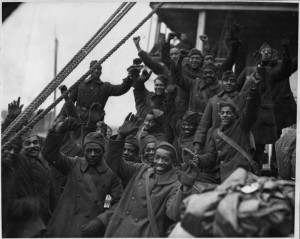Library of Congress
Carla D. Hayden: What the ‘First Black Woman’ Librarian of Congress Means
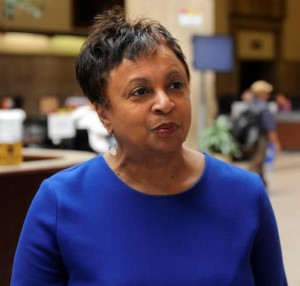 From Time: The Senate confirmed Carla D. Hayden as the 14th Librarian of Congress last week. She is being hailed as “the first woman and the first African American” to hold the position.
From Time: The Senate confirmed Carla D. Hayden as the 14th Librarian of Congress last week. She is being hailed as “the first woman and the first African American” to hold the position.
In our cultural discourse around firsts, “woman” usually means white woman, the largest recipients of affirmative action in the American workplace; “African American” signifies “black man,” whose accomplishments and concerns often define those of the race. That a black woman has achieved a first when she is often the very last represents progress for all people, of any color.
The moment’s true milestone is that she is the first person, period, other than a white man to ever hold the post in its 214-year history. (read more)
The Tragic Story of Dallas’ First African-American Police Officer
 From Smithsonian.com: As the city grieves police officers killed while protecting a peaceful protest, it’s worth remembering the life and death of Dallas’ first African-American police officer, William McDuff, whose story reveals the history both of black police officers in Dallas and the racial tensions that have plagued the city over the years.
From Smithsonian.com: As the city grieves police officers killed while protecting a peaceful protest, it’s worth remembering the life and death of Dallas’ first African-American police officer, William McDuff, whose story reveals the history both of black police officers in Dallas and the racial tensions that have plagued the city over the years.
McDuff was hired in 1896 after years of unsuccessful attempts to get African-American officers on Dallas’ police force failed, police historian W. Marvin Dulaney writes. He was appointed as a “special officer” to Stringtown, a predominantly poor, black neighborhood in the area now called Deep Ellum, in response to a series of disturbances near an AME church in the area. A newspaper report at the time noted that he was commissioned to keep order during services; it is unclear what his other duties may have been.
Dallas, Baton Rouge and the troubled history of black veterans in America
In a piece for The Washington Post, Brandeis professor Chad Williams writes: “African Americans have a long and proud history of participation in the U.S. armed forces. Black soldiers have fought in every war from the American Revolution to the present. I have written about their important role in World War I. They are powerful symbols of black patriotism and respectability, and demonstrate how — in spite of slavery, Jim Crow and institutionalized discrimination — African Americans have been willing to fight for their country and die for its ideals.
“Micah Johnson and Gavin Long (shooters in the recent Dallas and Baton Rouge incidents) violently disrupt this narrative. Their actions speak to a rarely acknowledged aspect of the history of African American veterans — one of injustice, disillusionment, trauma, racial militancy and undignified death. Johnson, Long and their troubled humanity remind us that the history of black servicemen and women has been fraught with tension. (read more)
Williams is associate professor and chair of the department of African and Afro-American studies at Brandeis University.
2016 PVILCA HOF and Hall of Honor Banquet sets attendance mark
 The Prairie View Interscholastic League Coaches Association’s recent Hall of Fame and Hall of Honor banquet in San Antonio posted record numbers, again, this time topping the 1,100 mark for attendees. Inductions for former coaches and players from the all-black PVIL schools during the segregationist era in Texas have been chosen since 1980, and attendance for the ceremonies have greatly increased each year.
The Prairie View Interscholastic League Coaches Association’s recent Hall of Fame and Hall of Honor banquet in San Antonio posted record numbers, again, this time topping the 1,100 mark for attendees. Inductions for former coaches and players from the all-black PVIL schools during the segregationist era in Texas have been chosen since 1980, and attendance for the ceremonies have greatly increased each year.
Next year’s event will be held in Houston on July 22, preceded on July 21 by the organization’s scholarship golf tournament at Herman Park. The scholarships benefit high school students. For more information, contact PVILCA Chairman Robert Brown at pvilca1940@yahoo.com.
The PVILCA is devoted to preserving and recognizing the history of the Prairie View Interscholastic League which existed from 1920 to 1970 as the governing body for athletic, academic, and band competitions for black high schools in Texas. When summarizing the organization’s primary mission, Brown said, “The PVILCA has set out to ensure that African American coaching and sports heroes do not lose their place in history.”
TIPHC Bookshelf
 Published scholarship on black history in Texas is growing and we’d like to share with you some suggested readings, both current and past, from some of the preeminent history scholars in Texas and beyond. We invite you to take a look at our bookshelf page — including a featured selection — and check back as the list grows. A different selection will be featured each week. We welcome suggestions and reviews. This week, we offer, “Civil Rights in the Texas Borderlands: Dr. Lawrence A. Nixon and Black Activism,” by Will Guzman.
Published scholarship on black history in Texas is growing and we’d like to share with you some suggested readings, both current and past, from some of the preeminent history scholars in Texas and beyond. We invite you to take a look at our bookshelf page — including a featured selection — and check back as the list grows. A different selection will be featured each week. We welcome suggestions and reviews. This week, we offer, “Civil Rights in the Texas Borderlands: Dr. Lawrence A. Nixon and Black Activism,” by Will Guzman.
In 1907, physician Lawrence A. Nixon fled the racial violence of central Texas to settle in the border town of El Paso. There he became a community and civil rights leader. His victories in two Supreme Court decisions paved the way for dismantling all-white political primaries across the South.
This Week In Texas Black History, July 17-23
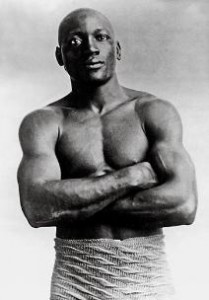 20 – On this day in 1910, Galveston native Jack Johnson was recognized as the heavyweight champion of the world. He had won the Negro heavyweight championship in 1903. The reigning white champion, Jim Jeffries, refused to cross the color line, so Johnson had to wait until Jeffries came out of retirement to fight him in 1910. Johnson left the United States in 1913 to avoid arrest on charges of violation of the Mann Act. When he returned on July 20, 1920, he was arrested and jailed at Leavenworth. After his release he returned to boxing, but without success. He died in an automobile crash at Raleigh, North Carolina, in 1946.20 –On this day in 1910, Galveston native Jack Johnson was recognized as the heavyweight champion of the world. He had won the Negro heavyweight championship in 1903. The reigning white champion, Jim Jeffries, refused to cross the color line, so Johnson had to wait until Jeffries came out of retirement to fight him in 1910. Johnson left the United States in 1913 to avoid arrest on charges of violation of the Mann Act. When he returned on July 20, 1920, he was arrested and jailed at Leavenworth. After his release he returned to boxing, but without success. He died in an automobile crash at Raleigh, North Carolina, in 1946.
20 – On this day in 1910, Galveston native Jack Johnson was recognized as the heavyweight champion of the world. He had won the Negro heavyweight championship in 1903. The reigning white champion, Jim Jeffries, refused to cross the color line, so Johnson had to wait until Jeffries came out of retirement to fight him in 1910. Johnson left the United States in 1913 to avoid arrest on charges of violation of the Mann Act. When he returned on July 20, 1920, he was arrested and jailed at Leavenworth. After his release he returned to boxing, but without success. He died in an automobile crash at Raleigh, North Carolina, in 1946.20 –On this day in 1910, Galveston native Jack Johnson was recognized as the heavyweight champion of the world. He had won the Negro heavyweight championship in 1903. The reigning white champion, Jim Jeffries, refused to cross the color line, so Johnson had to wait until Jeffries came out of retirement to fight him in 1910. Johnson left the United States in 1913 to avoid arrest on charges of violation of the Mann Act. When he returned on July 20, 1920, he was arrested and jailed at Leavenworth. After his release he returned to boxing, but without success. He died in an automobile crash at Raleigh, North Carolina, in 1946.
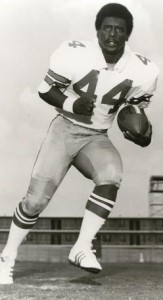 22 – On this day in 2014, Dallas Cowboys‘ great Robert Newhouse passed away from heart disease. Newhouse suffered a stroke in 2010 and had been under treatment at the Mayo Clinic in Rochester, Minn. where he passed away. Newhouse starred at Galilee High School in Hallsville, situated between Longview and Marshall. The University of Houston was the only major school recruiting offer he received and with the Cougars, from 1969-1971, Newhouse set several rushing records and left the school as its all-time single-season rushing leader with 1,757 yards as a senior. That total, at the time, was the second most rushing yards in a season in NCAA history and earned Newhouse second team All-American honors. He was a second round draft pick by the Cowboys in 1972 and played all of his 12 NFL seasons with Dallas. Newhouse led the team in rushing with 930 yards in 1975.
22 – On this day in 2014, Dallas Cowboys‘ great Robert Newhouse passed away from heart disease. Newhouse suffered a stroke in 2010 and had been under treatment at the Mayo Clinic in Rochester, Minn. where he passed away. Newhouse starred at Galilee High School in Hallsville, situated between Longview and Marshall. The University of Houston was the only major school recruiting offer he received and with the Cougars, from 1969-1971, Newhouse set several rushing records and left the school as its all-time single-season rushing leader with 1,757 yards as a senior. That total, at the time, was the second most rushing yards in a season in NCAA history and earned Newhouse second team All-American honors. He was a second round draft pick by the Cowboys in 1972 and played all of his 12 NFL seasons with Dallas. Newhouse led the team in rushing with 930 yards in 1975.
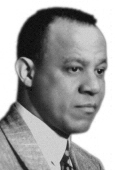 22 – On this day in 1944, Dr. Lawrence Nixon, an El Paso physician, voted in the Democratic primary, the first black voter in the state to do so. The Texas legislature had passed a law in 1923 forbidding blacks from voting in the primary. However, Nixon, working with the NAACP, challenged the law and attempted to vote on July 26, 1924 and was refused a ballot. Twice the U.S. Supreme Court ruled in his favor, however, the state Democratic Party found legal loopholes (including asserting the party was a private organization and could set restrictions on who could vote) to continue preventing blacks from voting in the primary. Finally, as a result of the Court’s ruling in Smith v. Allwright (where Lonnie Smith had brought a similar suit in Harris County), the all-white primary was ended on April 3, 1944 enabling blacks to vote in the primary. The Court ruled that a primary was an election and a political party was an agency of the state and thus could not discriminate by race.
22 – On this day in 1944, Dr. Lawrence Nixon, an El Paso physician, voted in the Democratic primary, the first black voter in the state to do so. The Texas legislature had passed a law in 1923 forbidding blacks from voting in the primary. However, Nixon, working with the NAACP, challenged the law and attempted to vote on July 26, 1924 and was refused a ballot. Twice the U.S. Supreme Court ruled in his favor, however, the state Democratic Party found legal loopholes (including asserting the party was a private organization and could set restrictions on who could vote) to continue preventing blacks from voting in the primary. Finally, as a result of the Court’s ruling in Smith v. Allwright (where Lonnie Smith had brought a similar suit in Harris County), the all-white primary was ended on April 3, 1944 enabling blacks to vote in the primary. The Court ruled that a primary was an election and a political party was an agency of the state and thus could not discriminate by race.
Blog: Ron Goodwin, author, PVAMU history professor
Ron Good  win’s bi-weekly blog appears exclusively for TIPHC/TBHPP. Goodwin is a San Antonio native and Air Force veteran. Generally, his column will address contemporary issues in the black community and how they relate to black history. He and the TIPHC/TBHPP staff welcome your comments. His latest blog is, “Independence Day.” Read it
win’s bi-weekly blog appears exclusively for TIPHC/TBHPP. Goodwin is a San Antonio native and Air Force veteran. Generally, his column will address contemporary issues in the black community and how they relate to black history. He and the TIPHC/TBHPP staff welcome your comments. His latest blog is, “Independence Day.” Read it
Submissions Wanted
Historians, scholars, students, lend us your…writings. Help us produce the most comprehensive documentation ever undertaken for the African American experience in Texas. We encourage you to contribute items about people, places, events, issues, politics/legislation, sports, entertainment, religion, etc., as general entries or essays. Our documentation is wide-ranging and diverse, and you may research and write about the subject of your interest or, to start, please consult our list of suggested biographical entries and see submission guidelines. However, all topics must be approved by TIPHC/TBHPP editors before beginning your research/writing.
We welcome your questions or comments via email or telephone – mdhurd@pvamu.edu.

